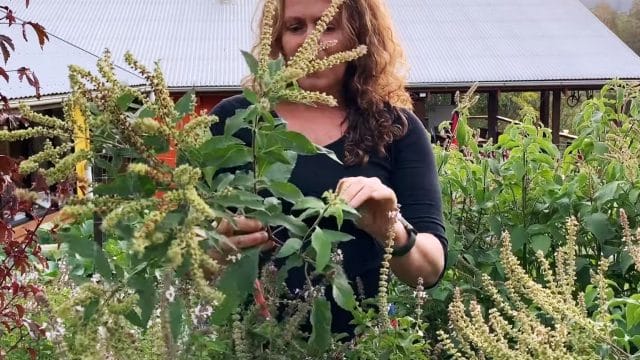I love perennial basil – this includes various forms of sacred basil and tulsi. For me, they are essential in a thriving permaculture garden.
Pest management & Medicines
They attract so many bees and provide important protection for little insectivorous birds – plus they are a great method to help you manage ‘pests’.
They are also a wonderful source of culinary and medicinal herbs. Tulsi tea can be expensive! But if you have one in your garden, you’ll be surprised at how easy it is to make the tea from the plant itself. Plus, it will save you loads and will help reduce your household waste.
A great method for attracting bees
Watch the video below to learn more about how to grow, harvest and use these wonderful plants. I also talk you through how these perennials promote habitat and diversity in the environment. With these plants spread out in different parts of your garden, you get to create a healthy environment for plants and insects.
You’ll also get to see the types of hardy perennial basil I grow. Plus, find out which plant my daughter liked to call the “bee bush” when she was younger. One of the best bee-magnets you’ll find!
Give it a watch and let me know below if you have any questions. You can find many more videos like this one on my YouTube.
What is permaculture?
To learn more about permaculture check out my 4 part permaculture series and take a look at Our Permaculture Life youtube channel where I have uploaded over 100 films I have made in my permaculture garden and in conversation with others. Dive deeper into this blog too and you will find over 400 permaculture articles.
Now is such a great time to learn more about permaculture and consider making permaculture your way of life and livelihood too. To help with this, I offer two online permaculture courses:
- Permaculture Educators Program – Permaculture Design & Teaching Certificates
- The Incredible Edible Garden – permaculture gardening course
I also encourage you to support free permaculture education programs for women and youth in the global south through our registered permaculture charity, the Ethos Foundation.



